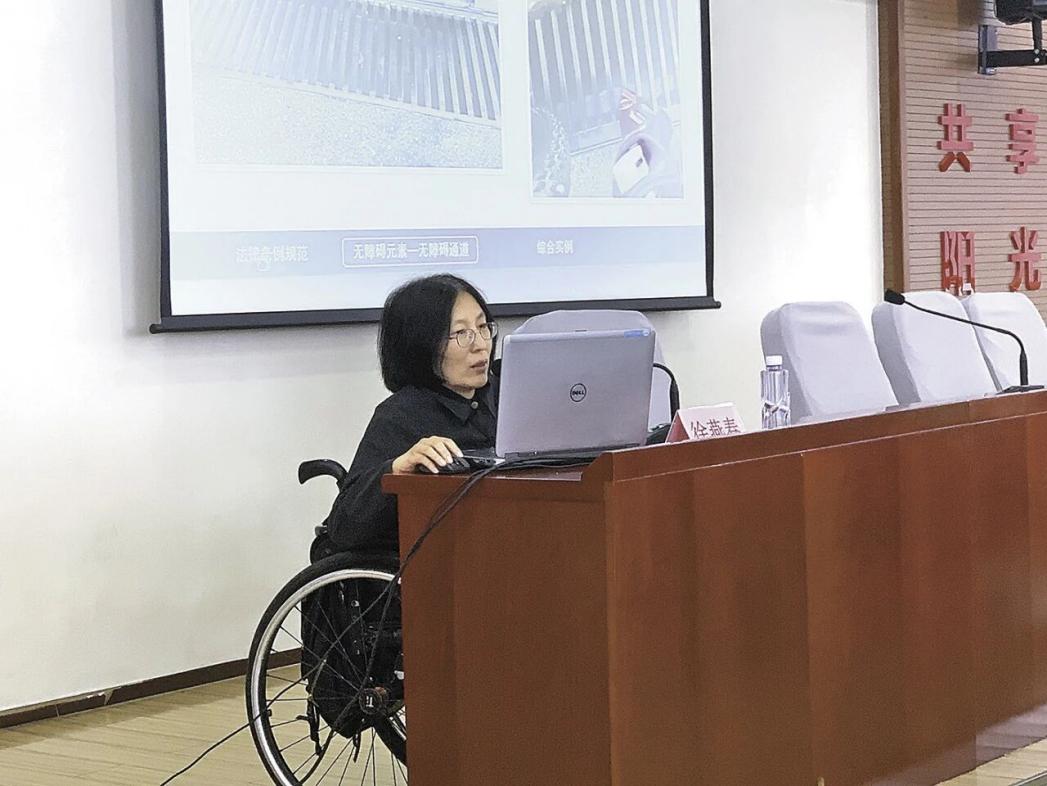




- BRNN
- BRI News
- BRNN News
- Database
Official Documents Polices and Regulations
Inter-government Documents International Cooperation BRI Countries
Business Guide Economic Data BRI Data
Trade
Investment Projects Latest projects
Cases - Content Pool

Xu Yanchun works in an office. (People's Daily/Shi Fang)
Just after 7 a.m., Xu Yanchun attached a powered front wheel to her wheelchair and began her commute across Beijing.
Her day included delivering accessibility training to over 100 supervisors in Fengtai District before providing guided interpretation for international visitors at the National Barrier-Free Environment Exhibition Hall. After travelling more than 50 kilometres, she returned home after 5:00 p.m.
Though weary, Xu expressed profound satisfaction: "This is a life I never dared imagine - supporting myself while contributing to society."
Born in 1974 with congenital spina bifida and scoliosis, Xu grew up aware of her physical differences, walking with an uneven gait due to differing leg lengths.
At 19, she enrolled in accounting at what is now Capital University of Economics and Business. Midway through her first semester, her legs grew progressively weaker. "The weakness started in my feet and calves, then spread to my thighs and eventually both legs," she recalled. Forced to use a wheelchair, she had to postpone her studies.
During her initial wheelchair years, Xu experienced significant emotional challenges, isolating herself indoors. Her turning point came upon reading a magazine quote: "Accept what cannot be changed, and change what can be changed." This philosophy inspired her transformation.
Xu mastered computer skills and established an online shop where she handled both customer service and management. In 2015, she joined a psychosocial rehabilitation program run by Beijing New Life Elderly and Disabled Services Center, where she not only gained practical skills but also met a group of like-minded friends.
Her career breakthrough came in 2018 when she participated in China's inaugural national accessibility and universal design training camp. "Seeing international experts design accessibility solutions for Olympic Village convinced me I could do this too," she explained. Through field studies in Shanghai, Dalian, Shenzhen, and Hong Kong, she systematically acquired accessibility technical standards, ultimately qualifying as a professional accessibility supervisor.
When Beijing launched its barrier-free environment initiative in 2019, Xu became a citywide lecturer, travelling by wheelchair across all 16 districts. She provided hands-on guidance for accessibility renovations in diverse settings - from municipal infrastructure and government centres to hospitals, shopping malls, and residential communities.
During facility inspections, she emphasised precision: "Call buttons must be positioned on the front side of toilets; accessible restrooms require a 1.5-metre wheelchair turning radius; low counters need adequate knee clearance. Barrier-free construction demands meticulous attention to detail."
Xu's expertise shaped Beijing's Naga Tree Café in Sanjing Hutong, where she collaborated through over ten design revisions and onsite construction supervision. The resulting fully accessible space features Braille navigation maps, lowered call buttons, adjustable sinks, and a Braille reading corner, becoming a beloved community hub. "This thoughtful design creates a welcoming public space for us," patrons noted.
Xu considers her disability a professional advantage: "As a wheelchair user, I can authentically evaluate accessibility functionality." To enhance her expertise, she taught herself architectural blueprint interpretation and improved her English for international standards access. In August 2023, her outstanding contributions earned her appointment as deputy secretary-general of the professional committee on standardization under the China Association of Volunteers for Persons with Disabilities.
Flatter roads, more convenient transportation, and easier public services - with continuous enhancements to barrier-free facilities in Beijing, Xu now often enjoys parks and shopping malls independently in her wheelchair. Her schedule stays packed, with at least three days a week spent traveling around the city. "I will keep working hard," she said, "so that accessibility development can benefit more people."

Tel:86-10-65363107, 86-10-65368220, 86-10-65363106